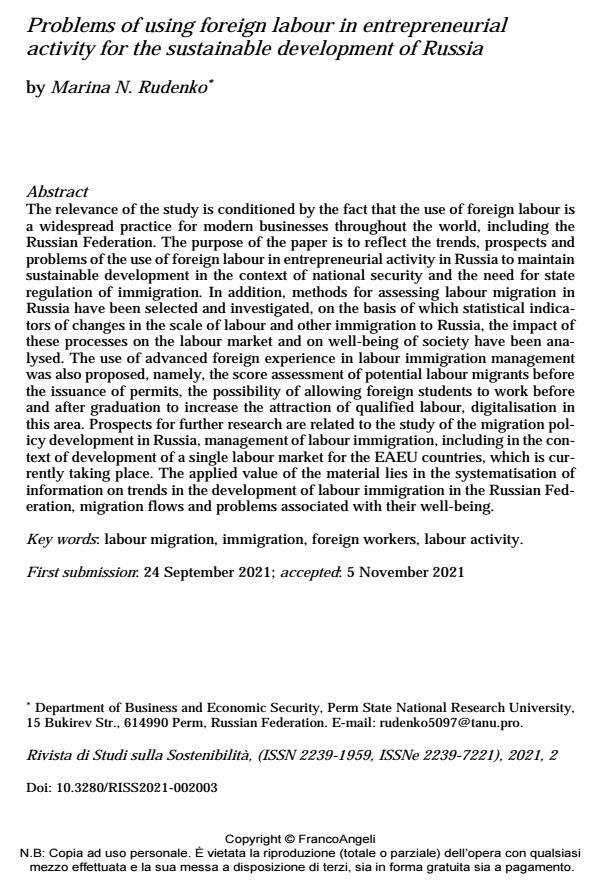Problems of using foreign labour in entrepreneurial activity for the sustainable development of Russia
Journal title RIVISTA DI STUDI SULLA SOSTENIBILITA'
Author/s Marina N. Rudenko
Publishing Year 2022 Issue 2021/2
Language English Pages 17 P. 15-31 File size 171 KB
DOI 10.3280/RISS2021-002003
DOI is like a bar code for intellectual property: to have more infomation
click here
Below, you can see the article first page
If you want to buy this article in PDF format, you can do it, following the instructions to buy download credits

FrancoAngeli is member of Publishers International Linking Association, Inc (PILA), a not-for-profit association which run the CrossRef service enabling links to and from online scholarly content.
The relevance of the study is conditioned by the fact that the use of foreign labour is a widespread practice for modern businesses throughout the world, including the Russian Federation. The purpose of the paper is to reflect the trends, prospects and problems of the use of foreign labour in entrepreneurial activity in Russia to maintain sustainable development in the context of national security and the need for state regulation of immigration. In addition, methods for assessing labour mi-gration in Russia have been selected and investigated, on the basis of which statis-tical indicators of changes in the scale of labour and other immigration to Russia, the impact of these processes on the labour market and on well-being of society have been analysed. The use of advanced foreign experience in labour immigra-tion management was also proposed, namely, the score assessment of potential labour migrants before the issuance of permits, the possibility of allowing foreign students to work before and after graduation to increase the attraction of qualified labour, digitalisation in this area. Prospects for further research are related to the study of the migration policy development in Russia, management of labour im-migration, including in the context of development of a single labour market for the EAEU countries, which is currently taking place. The applied value of the ma-terial lies in the systematisation of information on trends in the development of labour immigration in the Russian Federation, migration flows and problems asso-ciated with their well-being.
Keywords: labour migration, immigration, foreign workers, labour activity.
- Factors Influencing Chinese Migrants’ Entrepreneurial Activity in Russia: A Case Study of Sverdlovsk Region Jia Jin Lu, Liudmila S. Ruzhanskaya, in R-Economy /2023 pp.187
DOI: 10.15826/recon.2023.9.2.012
Marina N. Rudenko, Problems of using foreign labour in entrepreneurial activity for the sustainable development of Russia in "RIVISTA DI STUDI SULLA SOSTENIBILITA'" 2/2021, pp 15-31, DOI: 10.3280/RISS2021-002003